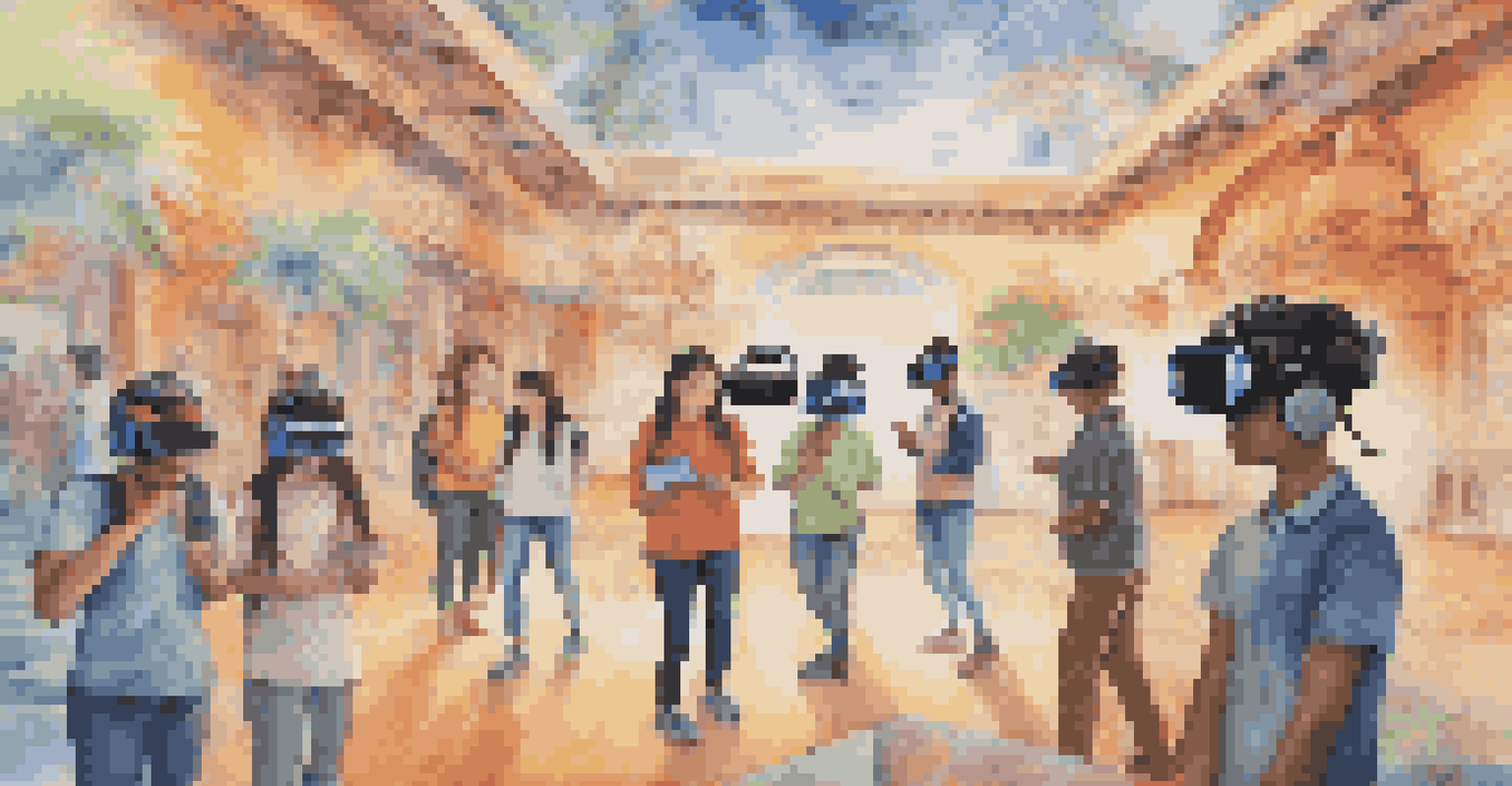AI and Cultural Competence: Fostering Global Citizenship

Understanding AI and Its Role in Global Citizenship
Artificial Intelligence (AI) is transforming how we engage with the world. It's not just about technology; it's about fostering understanding and connection among diverse cultures. As we embrace AI, we can leverage its capabilities to promote global citizenship, which emphasizes our shared responsibilities as members of a global community.
The great challenge of our time is to live together in a world of difference.
Global citizenship encourages awareness of cultural diversity and promotes empathy. By using AI tools, we can break down language barriers and provide access to information that celebrates different cultures. This creates a more inclusive environment where everyone can participate and contribute, regardless of their background.
For instance, AI-driven translation apps allow individuals from various countries to communicate effectively. This not only enhances personal connections but also supports collaborative efforts on global issues, such as climate change and social justice, fostering a sense of belonging across borders.
The Importance of Cultural Competence in Today’s World
Cultural competence is the ability to understand, appreciate, and interact with people from diverse backgrounds. In our increasingly interconnected world, this skill is essential for effective communication and collaboration. Without cultural competence, miscommunication can lead to misunderstandings and conflict.

By developing cultural competence, individuals can navigate complex social landscapes with greater sensitivity and awareness. This is where AI can play a pivotal role, providing insights into cultural norms and practices that might otherwise go unnoticed. With AI, we can better understand the nuances of different cultures, enhancing our interactions.
AI Enhances Global Citizenship
AI fosters understanding and connection among diverse cultures, promoting global citizenship through tools that break down language barriers.
For example, AI can analyze social media trends to reveal how different cultures express their values and beliefs. This data can inform our approach to international marketing, diplomacy, and humanitarian efforts, ensuring that we respect and honor cultural differences in all interactions.
AI Tools Enhancing Cross-Cultural Communication
AI tools are revolutionizing how we communicate across cultures. From real-time translation services to cultural awareness training programs, these technologies enable more meaningful interactions. They help us move beyond language proficiency to truly understand and appreciate cultural contexts.
We are all different, but we share the same human spirit. Perhaps it’s human nature that we adapt and survive.
One popular example is the use of AI chatbots that can communicate in multiple languages while adapting their responses based on cultural nuances. This ensures that users receive information that resonates with their specific cultural backgrounds, making conversations more engaging and effective.
Moreover, AI can help organizations identify potential cultural misunderstandings before they occur. By analyzing communication patterns and providing insights, AI empowers teams to adjust their strategies and foster a more inclusive atmosphere.
AI-Powered Education for Cultural Awareness
Education plays a crucial role in promoting cultural competence, and AI is reshaping how we learn about different cultures. AI-driven educational platforms can tailor learning experiences to individual needs, making cultural education more accessible and engaging for everyone. This personalized approach encourages deeper understanding and appreciation.
For instance, virtual reality (VR) experiences powered by AI allow learners to immerse themselves in different cultures. By experiencing traditions, customs, and daily life in various parts of the world, individuals can cultivate empathy and a genuine connection to global citizenship.
Cultural Competence is Essential
Developing cultural competence is crucial for effective communication in our interconnected world, and AI can provide valuable insights into diverse cultural norms.
Additionally, AI can help educators develop culturally relevant curricula that reflect the diversity of today’s society. This not only enriches the learning experience but also ensures that students appreciate the importance of cultural competence from an early age.
Addressing Ethical Implications of AI in Cultural Contexts
While AI offers numerous benefits for fostering cultural competence, it also raises ethical concerns that must be addressed. Issues such as bias in AI algorithms can perpetuate stereotypes and misunderstandings. It’s crucial to ensure that AI systems are designed with cultural sensitivity in mind to prevent these pitfalls.
To tackle these ethical challenges, developers must prioritize diversity in their teams and consider cultural perspectives during the design process. This collaborative approach can help create AI tools that genuinely reflect and respect the richness of global cultures.
Moreover, ongoing assessments of AI systems are essential to identify and rectify any biases that may arise. By committing to ethical practices, we can harness the power of AI to promote cultural competence without compromising cultural integrity.
The Role of AI in Promoting Social Justice
AI can be a powerful ally in promoting social justice by amplifying marginalized voices and addressing systemic inequalities. Through data analysis, AI can highlight disparities and help organizations identify areas where cultural competence is lacking. This information is vital for creating equitable solutions.
For example, AI can track patterns in social media discussions around justice issues, providing insights into public sentiment across different cultures. By understanding these dynamics, organizations can tailor their advocacy efforts to be more inclusive and effective.
Ethics in AI Must Be Prioritized
Addressing ethical implications, such as bias in AI algorithms, is vital to ensure that AI systems promote cultural sensitivity and respect for global diversity.
Ultimately, by leveraging AI to promote social justice, we can foster a greater sense of global citizenship. This proactive approach encourages individuals and organizations to take responsibility for creating a more equitable world, where everyone’s cultural identity is recognized and valued.
Building a Future with AI and Cultural Competence
As we look to the future, the integration of AI and cultural competence is key to fostering global citizenship. By embracing these tools and frameworks, we can create a world where diverse cultures are celebrated, and mutual understanding is prioritized. This vision is achievable if we commit to continuous learning and adaptation.
Organizations and individuals should invest in training programs that emphasize the importance of cultural competence in conjunction with AI. By equipping ourselves with the necessary skills and knowledge, we can navigate the complexities of a globalized world more effectively.

In conclusion, the synergy between AI and cultural competence holds tremendous potential for building bridges across cultures. Together, we can cultivate a global community that prioritizes empathy, understanding, and collaboration, ensuring that everyone has a seat at the table.